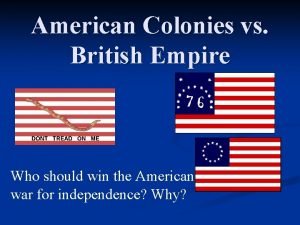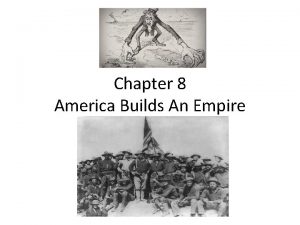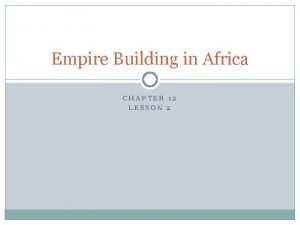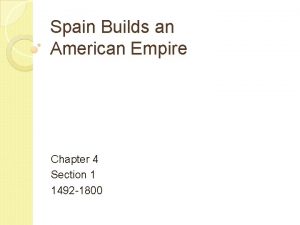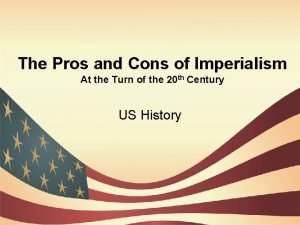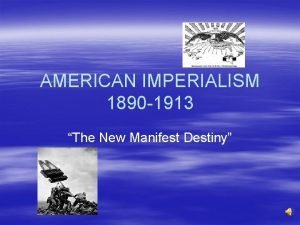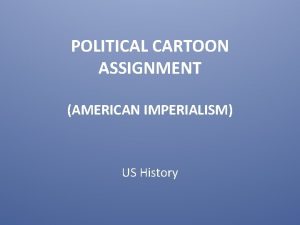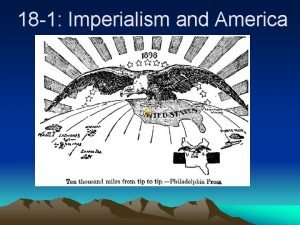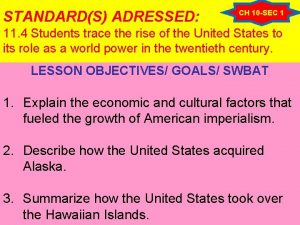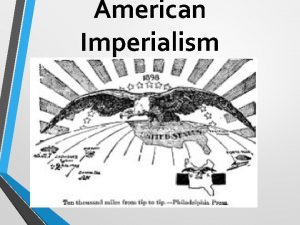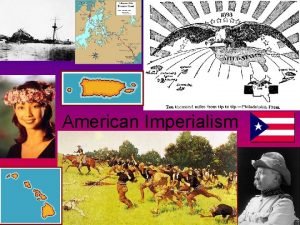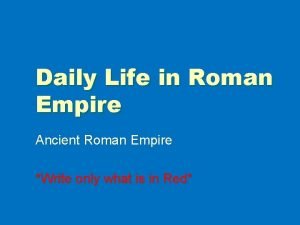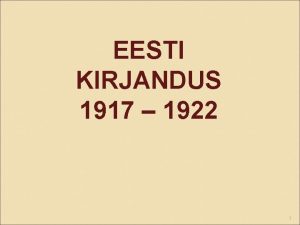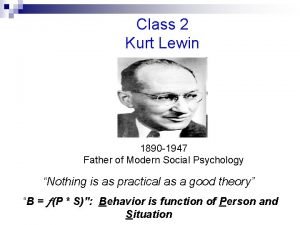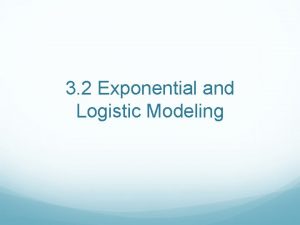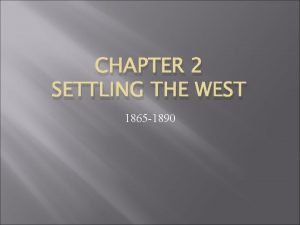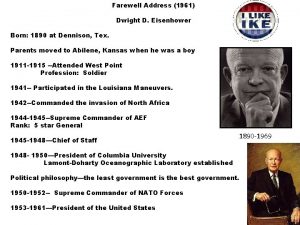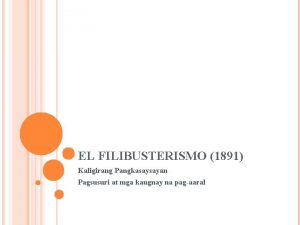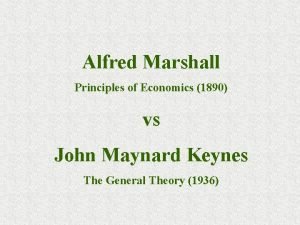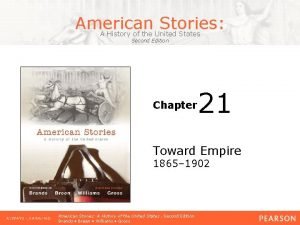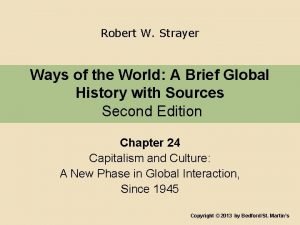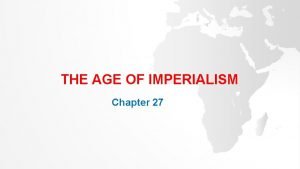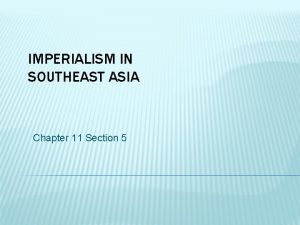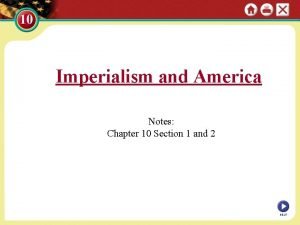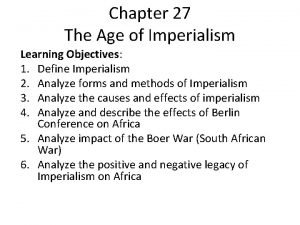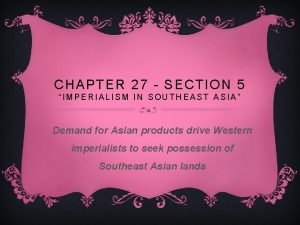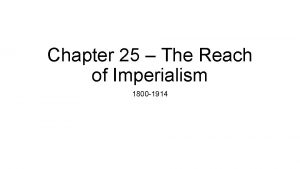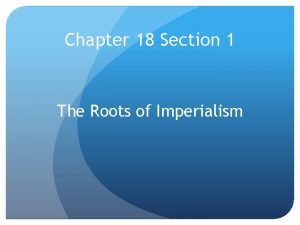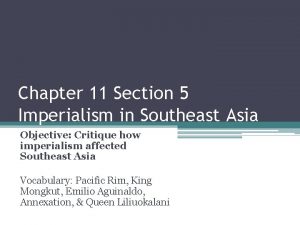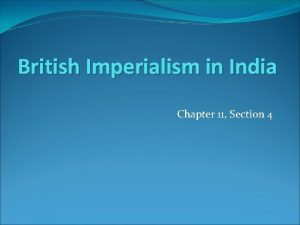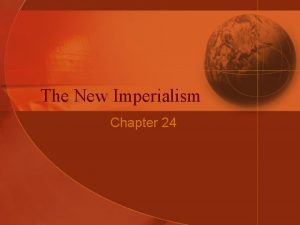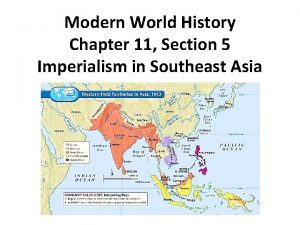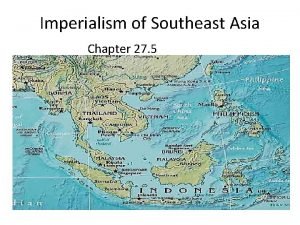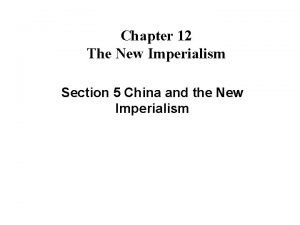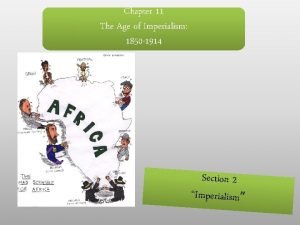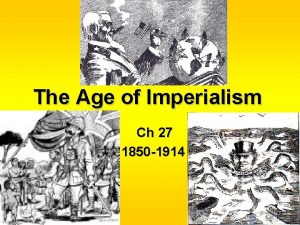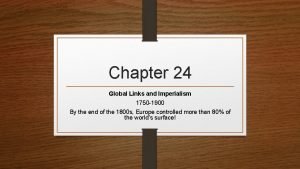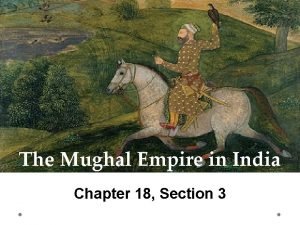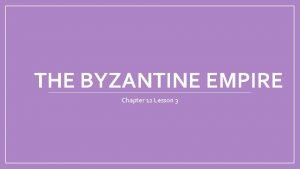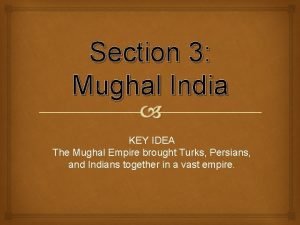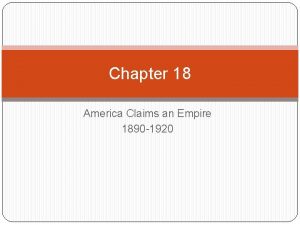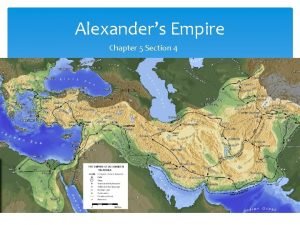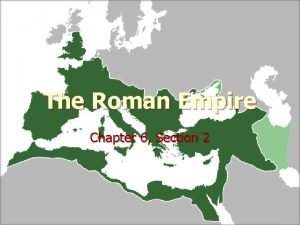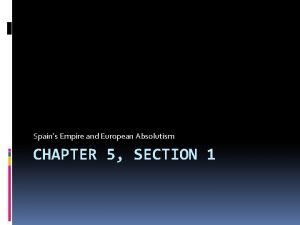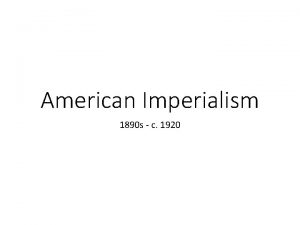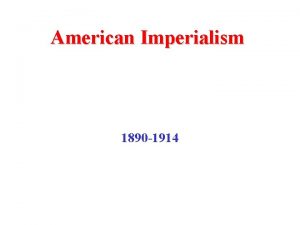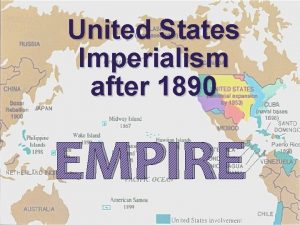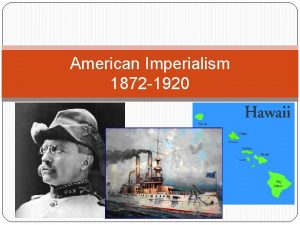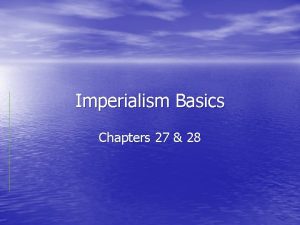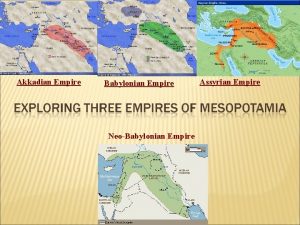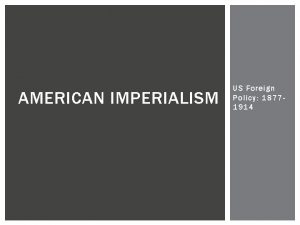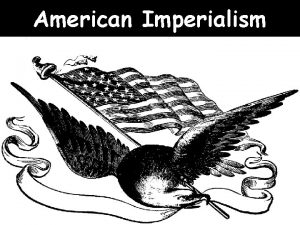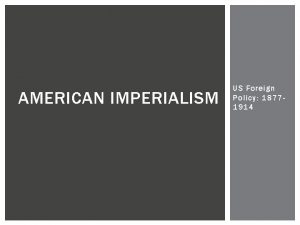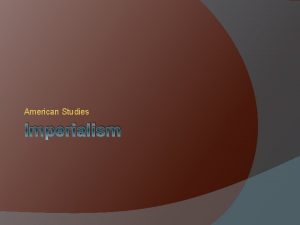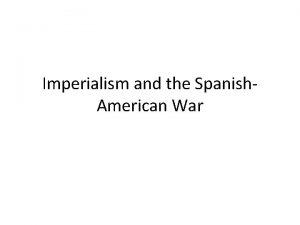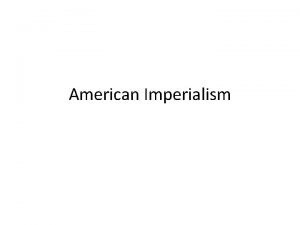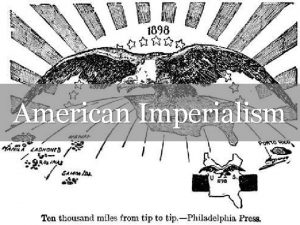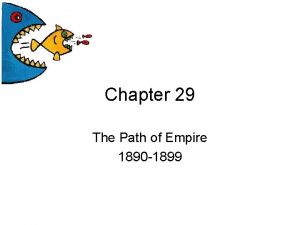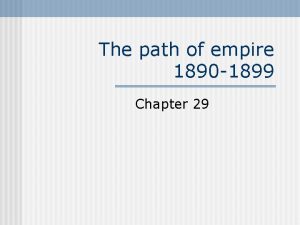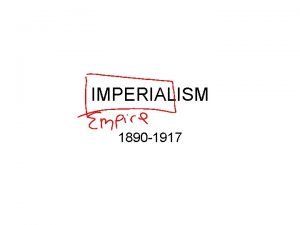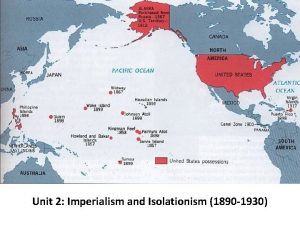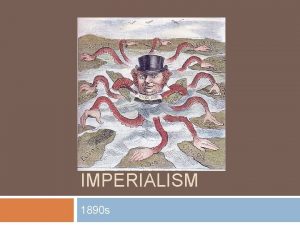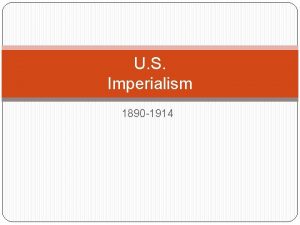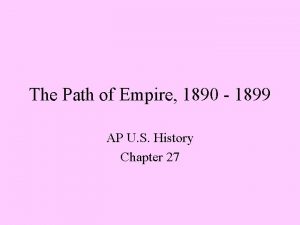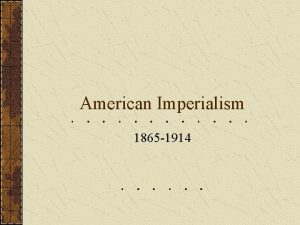American Imperialism Chapter 29 Path of Empire 1890































































- Slides: 63

American Imperialism Chapter 29: Path of Empire 1890 -1899

DVD/Videos The Spanish-American War: Birth of a Super Power The American President Executive Vision ▪ Monroe, Mc. Kinley, Wilson, Bush

Foreign Policy and the Early Republic Washington Farewell Address 1796 Monroe Doctrine 1823 Isolationism

Foreign policy Early Republic Washington’s Farewell Address 1796 Steer clear of alliances Build the nation Jefferson to 1890 s U. S. led a separate existence Extend commercial relations Monroe Doctrine 1823 Non-colonization ▪ Warning that American continents not subject for future colonization Non-intervention ▪ U. S. will not interfere in Europe

Post Napoleonic Wars AMERICAN CONCERNS Monarchs of Europe banded together attempting to restore monarchy that had been threatened by Napoleon and French Revolution Rumors Russia, Austria, Prussia and France would act together to insure the failure of rebellions in Spanish America BRITISH CONCERNS Wanted no part of continental Europe Offered a proposition to U. S. renouncing any interest in Latin America warning Europe to keep out of Latin American republics

American Isolation Monroe Doctrine 1823 Not much significance at the time An expression of nationalism Deepened illusion of isolationism Oceans isolated the U. S. until 1890 Secretaries of State dealt with foreign affairs

Industrialization and Foreign Policy Changing Conditions Debate Over Empire Expansionism and Asia

Post Civil War v Changing conditions Industrialization Sought world markets Bankers look foreign investments Immigration Millions enter Continue their interest in their old homeland Intellectual Look to Europe for ideas, examples New Manifest Destiny Expansion now overseas

Foreign Policy: Debate over Empire Turn of the 20 th Century ISOLATIONISTS ANTI-IMPERIALIST LEAGUE Empire building means EXPANSIONISTS IMPERIALISTS Violation of American values of self-government and freedom Build an ideal society Avoid conflict Expansion means military autocracy Grover Cleveland Mark Twain Samuel Gompers Empire building Necessary to survive in the world Expand or explode Industrial production means need for other markets War will make America fit Whetted nation’s appetite for adventures abroad Missionaries White Man’s Burden Jingoism Teddy Roosevelt Rudyard Kipling William Hearst, Joseph Pulitzer Yellow journalism

American Imperialism in Asia China Japan

ASIA

American Imperialism CHINA v China America became a Pacific power U. S. acquisition of ▪ Oregon (1846) ▪ California (1850) ▪ Increased opportunities for trade in the ▪ Far East ▪ Commercial interests pushed for trade with Japan 1844 Treaty of Wanghia (Britain and China) Opened Chinese ports to trade Extraterritoriality ▪ Foreigners who commit crimes will be tried in own courts Unequal treaties All other nations followed


American Imperialism JAPAN v Japan Opening of Japan 1854 U. S. sent warships commanded by Commodore Matthew Perry Treaty of Kanagawa 1854 ▪ U. S. and Japan ▪ Opened Japanese ports to trade ▪ Extraterritoriality Unequal treaties ▪ All other nations followed


Expansion The Pacific Alaska Stepping Stones Hawaii Midway Samoa

Expansion Overseas Pacific: ALASKA v Purchase of Alaska 1867 Russia Overextended in North America Concerned about the possibility of war with Britain and potential loss of Alaska to them Eager to unload their “frozen asset” Secretary of State, William Seward Ardent expansionist Purchased Alaska for $ 7. 2 million ▪ Less than two cents an acre “Seward’s Folly” Believed gold, fur, fish there v Results 1959 Became 49 th state 1968 Discovery of oil at Prudhoe Bay 1977 Completion of the Trans-Alaska Pipeline

Purchase of Alaska 1867

Alaska and the Lower Forty-Eight States A size comparison

Expansion Overseas Pacific Midway Island 1867 U. S. occupied Samoan Islands 1878 U. S. naval base at Pago Britain, Germany and U. S. compete for control 1889 Three way protectorate 1899 Divided between U. S. and Germany ▪ U. S. retained Pago

Expansion in the Pacific

The Influence of Sea Power upon History 1890 v The Influence of Sea Power upon History By Captain Alfred Thayer Mahan Control of the sea Key to world domination Stimulated naval race among the world powers Read by British, Germans and Japanese and fellow Americans Called for U. S. to build a(n) Isthmian canal (Panama Canal 1914) Two ocean navy (Great White Fleet 1908) Overseas empire ▪ Stepping Stones

Stepping Stones

U. S. in the Pacific 1900

Expansion Overseas Pacific: HAWAII Hawaii 1820 s New England missionaries 1840 s State Department warned other nations to stay out 1875 commercial reciprocal treaty Hawaii gave no territorial concessions to foreign powers Hawaiian sugar was duty free 1887 Pearl Harbor U. S. naval base with exclusive rights

Expansion Overseas Pacific: HAWAII 1890 Mc. Kinley Tariff Taxed Hawaiian products White planters on Hawaii pressed for annexation President Cleveland opposed annexation Queen Liliuokalani wanted native self-rule Question of Hawaii’s annexation ▪ Touched off the first full scale imperialist debate 1898 Spanish-American War Hawaii annexed 1959 Hawaiian statehood— 50 th state

Queen Liliuokalani • Last reigning queen of Hawaii • Defense of native Hawaiian self-governing • Touched off rebellion by white planters



Hawaiian Islands

American Imperialism Latin America First Pan-American Congress 1889 Venezuelan Boundary Dispute 1865 -1869

Latin America 1880 s Secretary of State, James Blaine Felt U. S. should dominate in the western hemisphere 1889 First Pan-American Congress U. S. and Latin America cooperate on matters of common concern Reciprocal tariff reduction

Latin America Venezuela v Venezuelan Boundary Dispute 1895 -1896 Venezuela and Britain Jungle unsurveyed Gold was discovered Tension increased Cleveland & Sec. of State Richard Olney said Britain by trying to acquire more territory was ▪ Violating the Monroe Doctrine U. S. demanded arbitration

Venezuela-British Guiana Boundary Dispute

Latin America Venezuela v. Venezuelan Boundary Dispute 1895 -1896 Britain denied relevance of Monroe Doctrine President Cleveland threatened force Britain Preoccupied with Boers (supported by Germany) in Africa Agreed to arbitration (Ironically) most of the land went to Britain

Venezuelan Boundary Dispute 1895 -1896 v. RESULTS U. S. asserted national power in world affairs Boost to Monroe Doctrine Enhanced prestige for U. S.

Election of 1896 William Mc. Kinley William Jennings Bryan

Election 1896 William Mc. Kinley (R) Big money William Jennings Bryan (D) Common man

Election of 1896

William Mc. Kinley 1897 -1901 Republican from Ohio Calm demeanor New corporate sensibility Pioneered modern management of the presidency Last president to have fought in the Civil War Reluctant to go to war Spanish-American War Reelected 1900 Assassinated by an anarchist in 1901 Third assassination in 36 years

Spanish-American War 1898 Background Sinking of the Maine 1898 Teller Amendment 1898 Rough Riders Paris Peace Treaty 1898 Results


Spanish-American War 1898 Background Cuba and Puerto Rico Last of Spain’s empire in the New World U. S. had designs on Cuba dating back to the 1840 s Polk tried to buy it for $ 100 million ▪ Spain refused 1854 Ostend Manifesto ▪ Another attempt to buy it for $ 120 million ▪ Northern states against it

Spanish-American War 1898 Background Cuban Rebellion 1895 Caused by economic strife Cuban sugar industry hurt by American tariff Spanish rule in Cuba Menaced trade in the region General Valerian (Butcher) Weyler Crushed rebellion American response U. S. sympathetic to Cubans President Cleveland refused to intervene Anti-imperialist

Spanish-American War 1898 v Yellow journalism 1895 -1898 Sensational and exaggerated news reporting Designed to sell papers and influence public opinion William Randolph Hearst Sent artist, Frederick Remington “You furnish the pictures. I’ll furnish the war. ” Joseph Pulitzer

Spanish-American War 1898 Sinking of the U. S. S. Maine 1898 Sent to Cuba to protect and evacuate Americans Exploded in Havana Harbor Feb. 15, 1898 ▪ 266 Americans dead U. S. blamed Spanish ▪ (Reality—internal, accidental causes) “Remember the Maine” ▪ Demand for war President Mc. Kinley opposed but ▪ Public opinion drove him

The Explosion of the Maine February 15, 1898 Outcry over the tragedy of the Maine helped drive the country to war.

Spanish-American War 1898 Declaration of war April 11, 1898 Teller Amendment U. S. denied any intention of annexing Cuba Theodore Roosevelt—Asst. Sec. of Navy Ordered Commodore George Dewey ▪ Proceed to the Philippine Islands ▪ Captured Manila Filipino leader, Emilio Aguinaldo Assisted the invasion

Spanish-American War 1898 v U. S. troops in Cuba Ill-equipped “Rough Riders” Part of the invading army Regiment of volunteers, cowboys Led by Lieutenant Colonel Teddy Roosevelt Battle of San Juan Hill Charge of the Rough Riders by Frederic Remington

The Cuban Campaign 1898

Spanish-American War Caribbean Theater

Teddy Roosevelt and the Rough Riders 1898

Spanish-American War Pacific Theater Dewey's Route to the Philippines 1898

Dewey’s Route in the Philippines 1898

Paris Peace Treaty 1898 Armistice August 12, 1898 Paris Peace Treaty 1898 TERMS ▪ Cuba free ▪ U. S. acquired ▪ Guam ▪ Puerto Rico ▪ U. S. paid Spain $20 million for the Philippines* RESULTS ▪ Impassioned debate in the Senate and the country over the Philippines

Philippines Filipinos aided the U. S. against Spain Then fought Americans until 1901 U. S. forces used methods like Spain’s in Cuba Over 4, 000 U. S. troops died during the Philippine fight 1901 American civilian government Jones Act 1916 Philippines granted self- government Territorial status Promise of independence WWII Filipinos fought Japanese July 4, 1946 Philippine independence

Cuba U. S. forces occupied Cuba until 1902 Prepared them for independence General Leonard Wood improved ▪ Government finance, education, agriculture, public health Dr. Walter Reed Found the cause of yellow fever ▪ Mosquito—the lethal carrier ▪ Paves the way for building the canal Platt Amendment 1901

Platt Amendment 1901 v. Added to Cuban constitution Cuba will make no agreement that would impair independence U. S. can intervene to keep order Guantanamo 28, 000 acres U. S. naval base ▪ (to this day)

Spanish-American War 1898 Results 1. 2. 3. 4. 5. 6. 7. 8. 9. 10. 11. 12. 13. 14. 15. Acquired Philippines Cuba free/with a difference Spain out of the western hemisphere Annexed Hawaii Acquired Guam and Puerto Rico Discovered cause of yellow fever Brought North and South together Brought U. S. closer to Great Britain White Man’s Burden Built the Panama Canal Big navyism—Great White Fleet Stepping stone for Teddy Roosevelt’s candidacy Splendid Little War— 113 days, low in casualties Increased prestige for U. S. an imperialist nation


American Empire in Two Hemispheres 1917

U. S. Territorial Expansion in the Late Nineteenth Century • Major period of U. S. territorial expansion abroad came in a short burst of activity • Newspapers and some politicians beat the drums for empire.

Colonialism 1914
 American empire vs british empire
American empire vs british empire Old imperialism motives
Old imperialism motives How were old imperialism and new imperialism similar?
How were old imperialism and new imperialism similar? Chapter 8 america builds an empire
Chapter 8 america builds an empire Empire building in africa summary
Empire building in africa summary Spain builds an american empire chapter 20 section 1
Spain builds an american empire chapter 20 section 1 Pros and cons of imperialism
Pros and cons of imperialism What three factors spurred american imperialism
What three factors spurred american imperialism Roots of american imperialism
Roots of american imperialism American imperialism definition
American imperialism definition American imperialism political cartoons explained
American imperialism political cartoons explained Message behind
Message behind Economic roots of american imperialism
Economic roots of american imperialism What 3 factors spurred american imperialism?
What 3 factors spurred american imperialism? American imperialism 1800s
American imperialism 1800s Russia wants alska
Russia wants alska Roman empire family life
Roman empire family life Mauryan empire and gupta empire venn diagram
Mauryan empire and gupta empire venn diagram Unity iot
Unity iot Kirjanik 1898-1978
Kirjanik 1898-1978 Agnosia cromatica
Agnosia cromatica Father of social psychology
Father of social psychology 1890'lı yıllarda ingiltere'de whiff
1890'lı yıllarda ingiltere'de whiff The population of smallville in the year 1890 was 6250
The population of smallville in the year 1890 was 6250 The population of smallville in the year 1890 was 6250
The population of smallville in the year 1890 was 6250 Gjengangere kritisk realisme
Gjengangere kritisk realisme 1890 computer
1890 computer Native clothing
Native clothing Why did rizal choose morga?
Why did rizal choose morga? Naglimbag ng noli me tangere
Naglimbag ng noli me tangere Pagkokontrast
Pagkokontrast Born 1890
Born 1890 Marso 29 1891
Marso 29 1891 Alfred marshall principles of economics 1890
Alfred marshall principles of economics 1890 American empire map
American empire map The american empire
The american empire Chapter 27 building vocabulary the age of imperialism
Chapter 27 building vocabulary the age of imperialism Imperialism in southeast asia chapter 11 section 5
Imperialism in southeast asia chapter 11 section 5 Imperialism and america chapter 10 section 1
Imperialism and america chapter 10 section 1 Chapter 27 building vocabulary the age of imperialism
Chapter 27 building vocabulary the age of imperialism Imperialism in southeast asia chapter 27 section 5
Imperialism in southeast asia chapter 27 section 5 The reach of imperialism vocabulary activity
The reach of imperialism vocabulary activity Chapter 18 section 1 the roots of imperialism
Chapter 18 section 1 the roots of imperialism Chapter 11 section 5 imperialism in southeast asia
Chapter 11 section 5 imperialism in southeast asia Chapter 11 section 4 british imperialism in india
Chapter 11 section 4 british imperialism in india Chapter 24 section 5 china and the new imperialism
Chapter 24 section 5 china and the new imperialism Chapter 11 section 5 imperialism in southeast asia
Chapter 11 section 5 imperialism in southeast asia Imperialism in southeast asia chapter 27 section 5
Imperialism in southeast asia chapter 27 section 5 Chapter 14 the height of imperialism
Chapter 14 the height of imperialism Chapter 12 section 5 china and the new imperialism
Chapter 12 section 5 china and the new imperialism Chapter 11 the age of imperialism
Chapter 11 the age of imperialism Chapter 27 the age of imperialism
Chapter 27 the age of imperialism Chapter 24 global links and imperialism
Chapter 24 global links and imperialism Chapter 10 section 1 imperialism and america
Chapter 10 section 1 imperialism and america Chapter 18 section 3 the mughal empire in india
Chapter 18 section 3 the mughal empire in india Chapter 12 lesson 3
Chapter 12 lesson 3 Chapter 18 section 3 the mughal empire in india
Chapter 18 section 3 the mughal empire in india Chapter 23 section 3 napoleon forges an empire
Chapter 23 section 3 napoleon forges an empire Chapter 18 building vocabulary america claims an empire
Chapter 18 building vocabulary america claims an empire How was philip ii able to conquer greece
How was philip ii able to conquer greece Chapter 6 section 2 the roads of the roman empire
Chapter 6 section 2 the roads of the roman empire Chapter 5 section 1 spain's empire and european absolutism
Chapter 5 section 1 spain's empire and european absolutism Chapter 7 section 3 napoleon forges an empire
Chapter 7 section 3 napoleon forges an empire Lesson 2 the arab empire and the caliphates
Lesson 2 the arab empire and the caliphates
